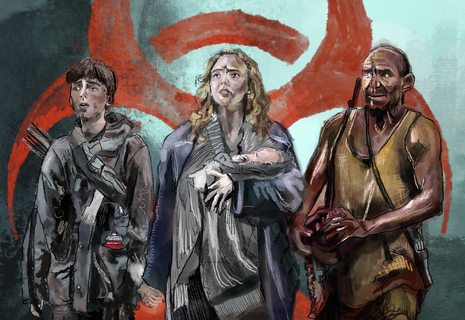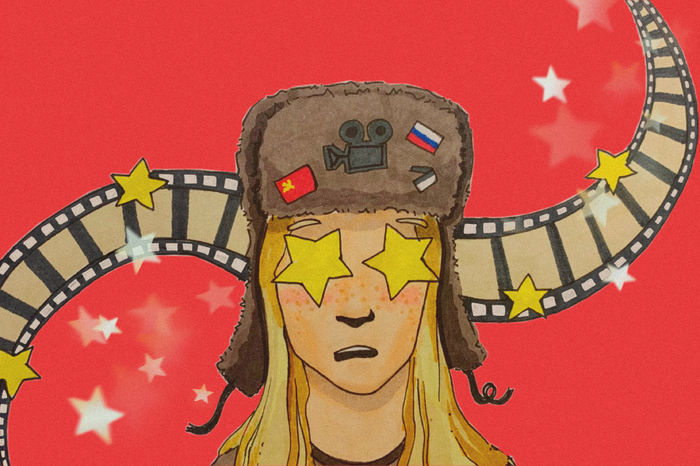Reanimating a franchise with 28 Years Later
Jacob Smith reviews Boyle’s latest addition to his post-apocalytic universe

Let’s cut to the chase. 28 Years Later is a claustrophobic, adrenaline fuelled thriller which will have you jumping, gasping… and crying. Because as much as it is a tense horror, it is equally a heartfelt coming of age story. It buries itself deep in the middle of the dichotomy of horror and drama and blooms by blurring the two genres into each other. All whilst utilising a distinct yet familiar visual style; Boyle-esque all the way down to its use of iPhone cameras to film in homage to the cheap handheld cameras of the original cult classic, 28 Days Later. The movie, not just in cinematography, is a worthy successor to the original, a triumphant proclamation of cinematography as a visual art, and British film making as a force to be reckoned with.
“28 years later is a claustrophobic, adrenaline fuelled thriller which will have you jumping, gasping… and crying”
Whilst Boyle’s original focuses on radiating a suburban punk atmosphere through a landscape decimated by an unbeatable virus, his sequel has a different focus: family. Boyle’s frenetic, jumpy, and oppressively tight cinematic style carries the punk ethos into a new world, one emblematic of the quaint village life many Brits may recognise, but regressed to a distinctly 1940’s style of living, built on rations, communal living, and the threat of death enclosing around the island. It’s here, on the island of Lindisfarne, where Spike (Alfie Williams) and Jamie (Aaron Taylor-Johnson) plot to make a trip to the mainland in hopes of proving Spike’s manhood by claiming his first kill. Needless to say, plans go awry, and the journey to manhood becomes less about killing and more about saving. Without spoiling anything, the plot’s twists and turns are fueled by an acute understanding of the bonds of family: how they break, strain, grow, and are torn from us when we most need them. And most crucially, how these developments force us to grow. Alfie Williams delivers a brutally convincing portrayal of a young boy forced to grow up faster than he can, but it may be Jodie Comer (Isla) who delivers the most touching performance. In a world of hulking cannibal humans and almost fantastical characters, the beating heart of the movie is the naturalistic performance of a sick mother, confused but steadfast in her love for her only son.
“The journey to manhood becomes less about killing and more about saving”
Aaron Taylor-Johnson’s performance as Jamie is the foundation of the film: both in its foregrounding in the first half of the film but also in the way that it sets up the eventual emotional climax with his mother. Flawed fathers are tricky, especially on film. In the short run time of a movie, capturing a convincing flawed patriarch is too lengthy, and so reliable traits of abuse persist as easy signifiers. And whilst they should be shown and explored, what makes Spike’s journey so moving is that his father truly does love him, and truly does care for his mother. The familiar culture of patriarchy is very much still alive, even in this apocalyptic, commune environment where everything else we recognise about society is dead, and Taylor-Johnson’s performance is complicated by it: he is a man who loves his wife and son, but he is still a man.
The movie is as fantastical as it is grounded: Boyle’s rebellious style is arguably more overt in the sequel with its cast of side characters, set pieces, and music. Sadly, this has generated criticism, most notably for its adherence to realism, a cheap gripe considering that it is a movie about a ‘rage virus’ which turns humans into cannibals; and for its ending, a slightly more valid critique which seems purposefully provocative, considering a sequel is currently in production. My own personal gripe is a third, a culmination of the latter feature and the slightly confused portrayal of Isla’s illness, which feels as if either a bait and switch is half heartedly played, or as if a plot thread was changed later into production.
The good news is that this collection of gripes is short, and vastly overshadowed by a tremendous cast of performances, beautiful set pieces, tear jerking moments, and a killer soundtrack to top it all off. It’s a (bloody) fantastic watch.
 News / Judge Business School advisor resigns over Epstein and Andrew links18 February 2026
News / Judge Business School advisor resigns over Epstein and Andrew links18 February 2026 News / Hundreds of Cambridge academics demand vote on fate of vet course20 February 2026
News / Hundreds of Cambridge academics demand vote on fate of vet course20 February 2026 News / Petition demands University reverse decision on vegan menu20 February 2026
News / Petition demands University reverse decision on vegan menu20 February 2026 News / CUCA members attend Reform rally in London20 February 2026
News / CUCA members attend Reform rally in London20 February 2026 News / Gov grants £36m to Cambridge supercomputer17 February 2026
News / Gov grants £36m to Cambridge supercomputer17 February 2026










